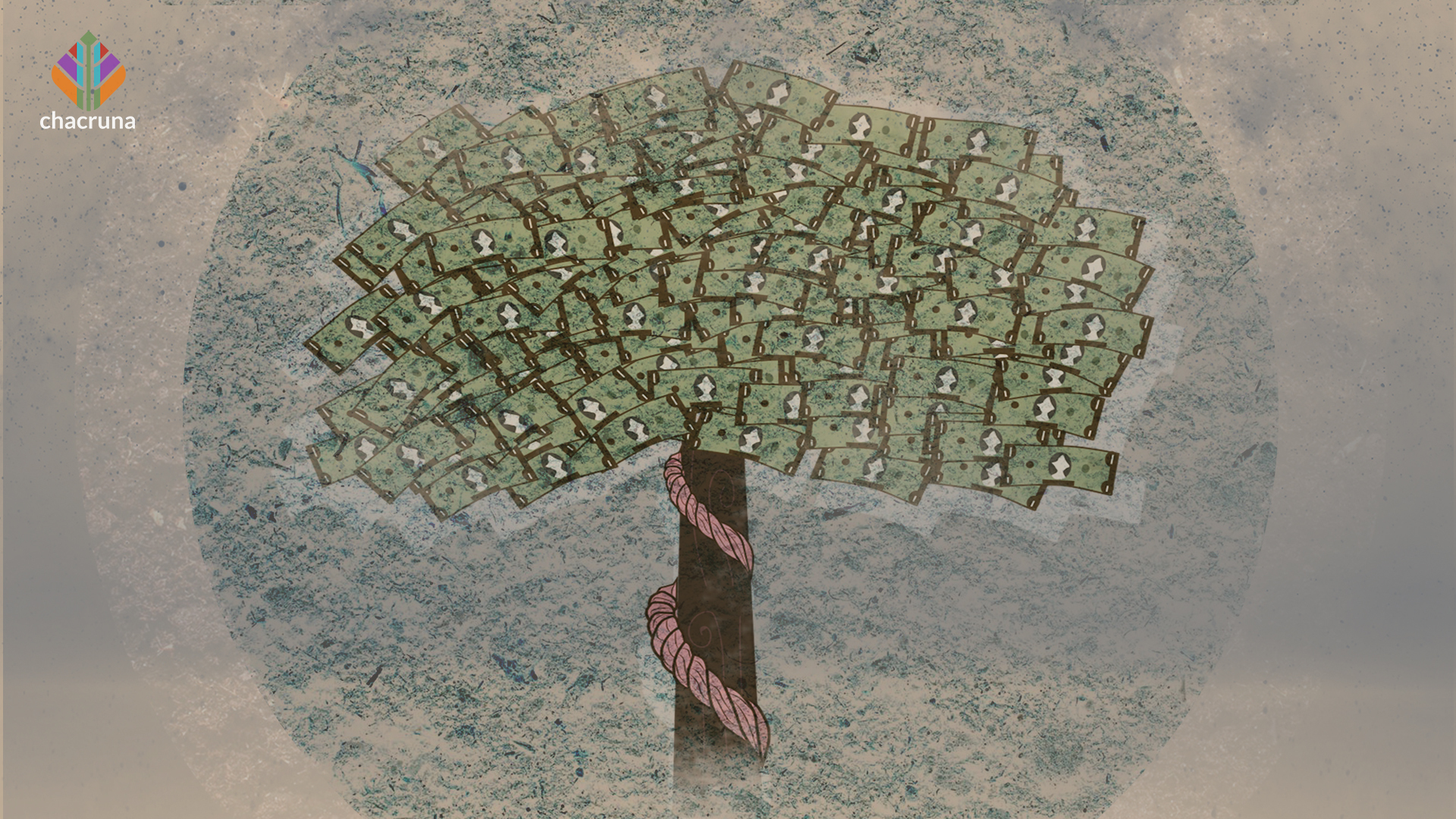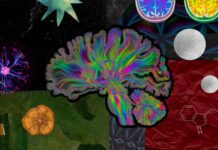- Chacruna Survey Results on the Awareness of Sexual Abuse in Ayahuasca Settings - January 31, 2023
- Indigenous Reciprocity Initiative of the Americas: A Respectful Path Forward for the Psychedelic Movement - April 23, 2022
- Creating Awareness on Sexual Abuse in Ayahuasca Communities: A Review of Chacruna’s Guidelines - February 8, 2022
Entrepreneurism, the processes of initiating and enterprising one’s own business or organization, emerges all around us, and mostly proliferates in potential business settings that reflect untapped or high-demand markets that can accommodate new investments and start-up companies. The Amazon Basin is no exception to this global phenomenon. In fact, entrepreneurial businesses have long been operating in its midst, particularly since the seventeenth century, via strong colonial trade networks in animal skins, timber, vanilla, cacao, and later, quinine, rubber, and other commodities that propelled personal business pursuits.
Ayahuasca has newly emerged as a commodity in this entrepreneurial landscape as tourists increasingly visit Amazonian cities and rural areas. Ayahuasca holds great fascination for travelers, particularly because of its potential for providing hallucinatory visions that can be used to diagnose and heal illness, as well as provide psychotherapeutic benefits, alongside its association with romanticized and exoticized images of Amazonia in the popular imagination.
Ayahuasca tourism has ignited the potential economic business lure ablaze with local, national, and international interests in ayahuasca as part of broader sets of globalization processes.
Once a rare and unique opportunity reserved for the intrepid adventurer, ayahuasca ceremonies and retreats are now offered frequently enough to be considered commonplace. I suggest that until recently, ayahuasca, as a potential industry, has mostly remained untapped because of its spiritual and religious uses that may be seen as antithetical to modernity, alongside its variable legal status. Its temporary haven as an unexploited market is also linked to a general interpretation of the ayahuasca experience as being sacred and therefore outside of the realm of capitalism. However, for the last two decades, the emerging position of the ayahuasca experience as a potential income source, both locally and internationally, can no longer be ignored. Ayahuasca tourism has ignited the potential economic business lure ablaze with local, national, and international interests in ayahuasca as part of broader sets of globalization processes.
As healers and sorcerers, ayahuasqueros have always been integral to their local and regional economies, yet systems of reciprocity and tendencies toward egalitarianism, whereby peoples’ livelihoods may be different but their lifestyles are not, have meant that their status did not indicate economic stratification.
It is important to first distinguish between ayahuasca as part of a local economy and ayahuasca as a form of entrepreneurism. Economically, shamans and ayahuasqueros have long been participating in various forms of exchange that have generally compensated them for their time, skills, and talents. They have tended to peoples outside of their communities, cities, and countries. Indeed shamans from “afar” are often perceived as being more powerful, and therefore people tend to travel great distances to cure more serious illnesses or social problems. As healers and sorcerers, ayahuasqueros have always been integral to their local and regional economies, yet systems of reciprocity and tendencies toward egalitarianism, whereby peoples’ livelihoods may be different but their lifestyles are not, have meant that their status did not indicate economic stratification.
In this article I view “ayahuasca entrepreneurism” as a set of responses to the dynamics of increased ayahuasca tourism and the marketing strategies used to attract such tourism. This phenomenon has resulted in the proliferation of shamans, ayahuasqueros, tourist lodges, and agencies that provide the ayahuasca experience alongside a plethora of other secondary businesses that participate in this rise in popularity and demand. In referring to the entrepreneurial role, I highlight the opportunistic features of that push toward profit maximization, whereby profit can also include enterprises such as NGO’s, eco-ventures, and charitable institutions. Entrepreneurism is also a cultural process that reflects consumer targeting and desires, and the social and political milieus and principles to which these businesses abide and in which they operate.
Ayahuasca tourism and ceremonies have generated a series of profit-based opportunistic small businesses that link into the larger, broader industries, such as adventure travel, international tourism, and the New Age movement . To illustrate how such small-scale entrepreneurism emerges and expands, I focus on the Tambopata Province of Madre de Dios, Peru; one of many regions that attract ayahuasca tourists, and then broaden the analysis to include the international market for ayahuasca. Tambopata is a biodiversity “hot-spot,” comprised of the Tambopata National Reserve and the Bahuaja-Sonene National Park. Its economy is based on the extraction of raw materials, including gold mining and timber, as well as forest products, such as Brazil nuts.
Although nowadays ayahuasca is an important aspect of the regional economy, only 30 years ago the ayahuasca usage landscape was starkly different. In the 1980s, the information for non-locals who were interested in experiencing ayahuasca was scarce and very few people were openly known as ayahuasqueros. The silence and secrecy that once effusively surrounded ayahuasca practices is understandable considering that municipal officials, the Catholic Church, and evangelical groups have systematically condemned the practice of ayahuasca drinking . The setting in the 1980s, when there were only two lodges and no other touristic operations, apart from a few freelance guides, has changed significantly. Since then the dramatic increase in tourism, lodges, and the influx of people has had strong local impacts. The fact that national visitors and international tourists were seeking out ayahuasca prompted local peoples and businesses to perceive it as something valuable. Consequently, ayahuasca began to be viewed as a potentially lucrative source of income whose demand by outsiders helped to validate its legitimacy. This meant that more people wanted to become openly associated with ayahuasca, including many who had no prior interest or knowledge about it, and this also served as a catalyst for the current proliferation of ayahuasqueros and their apprentices. Accordingly, ayahuasca became much more accessible, less secretive, and more readily available via individuals and lodges.
Locally, the critical nucleus for an ayahuasca ceremony had usually been the patient and the healer. This can also include assistants and family and community members. In such a setting, there is little that resembles a formal business, apart from the fact that services are rendered and some form of compensation, usually voluntary, eventually follows. The eco-lodges in the Tambopata area represent much larger-scale entrepreneurism, advertising ayahuasca ceremonies as one of many possible activities that their guests may participate in. Some lodges have been exclusively set up with ayahuasca retreats in mind, and are strongly linked to the New Age movement, either through their ownership or their clientele.
A frequent origin narrative among a subset of more recent lodges is that the owners were greatly enthused by ayahuasca visions and were thus inspired to permanently move to the place where they had their ayahuasca “awakening”, an experience in which one experiences their own “divinity” and stirs one to dedicate his or her life to a greater spiritual quest.
In the last two decades non-local Peruvian nationals and non-Peruvian entrepreneurs founded a majority of these lodges; they often incorporate a local partner, though more usually, a caretaker. This trend reflects the ability of non-locals or foreigners to advantageously seize such entrepreneurial opportunities. A frequent origin narrative among a subset of more recent lodges is that the owners were greatly enthused by ayahuasca visions and were thus inspired to permanently move to the place where they had their ayahuasca “awakening”, an experience in which one experiences their own “divinity” and stirs one to dedicate his or her life to a greater spiritual quest. I have commonly witnessed ayahuasca tourists return to Tambopata with messianic zeal, believing that they were “chosen” to save the world, which can be something positive if rooted in an understanding of local reality and is not detrimental to others.
In Tambopata, the ayahuasca entrepreneurial ecosystem has had various negative impacts on local populations who have long depended upon ayahuasqueros for purposes of health. These changes are part of a comparatively pan-Amazonian response to international ayahuasca tourism and the resultant processes of commodification and appropriation of their practices that entails local peoples’ inaccessibility to ayahuasqueros due to tourist obligations, the legitimacy of practices, the sanitization of rituals for Western purposes, and a host of health and safety issues affecting both locals and tourists.
In many cases, this creates blindness on the part of ayahuasca seekers toward the social and economic differences between Amazonians and non-Amazonians.
Ayahuasca tourism and its diaspora has also fostered a strong embracement of cosmopolitanism -a shared philosophical commitment to “the primacy of world citizenship over all national, religious, cultural, ethnic and other parochial affiliations”- creating a sense for ayahuasca tourists that they are all part of a singular utopian community. In many cases, this creates blindness on the part of ayahuasca seekers toward the social and economic differences between Amazonians and non-Amazonians. The rising cosmopolitanism of ayahuasqueros has much to do with the capitalistic entrepreneurial ecosystem in which all participants partake. The income ayahuasqueros amass while traveling abroad to participate in ayahuasca sessions is often used to purchase urban homes or to funded their own lodge from money earned abroad and has played a role in the increased urbanization of Amazonian peoples..
Indeed, in particular instances,entrepreneurship has been associated with piracy because, similar to pirates, entrepreneurs may sometimes appropriate value that they themselves have not created, thus unsettling processes of supply and demand.
Ayahuasca entrepreneurism also needs to be understood as part of the colonial legacy and postcolonial context from which it sprang forth, and within which it continues to be shaped. Economic growth and prosperity have been uneven across all sectors of society, and indigenous peoples and their lands have suffered at the behest of a long history of extractive industries, including rubber and, more recently, oil and gas companies. Indeed, in particular instances, entrepreneurship has been associated with piracy because, similar to pirates, entrepreneurs may sometimes appropriate value that they themselves have not created, thus unsettling processes of supply and demand. In sum, entrepreneurial efforts range from the most grassroots homestead where profits are more localized to larger tourist agencies and organizations that see an opportunity to find their niche, make their mark and make money while the profits are garnered and stored elsewhere. As the ayahuasca ecosystem expands, ayahuasca tourists search for this ‘way of life’…and are ironically creating more ‘ways of making a living’.
When the ayahuasca market becomes determined and controlled by non-locals, forms of colonialist practices emerge amidst these various entrepreneurial opportunities to find a market niche and generate profits. The ayahuasca diaspora is aligned with the tendency for goods to flow from the “south” to the “north” (or also, toward powerful nationals), and, while it holds the promise of the great global transformations precipitated by many of its forerunners, such as rubber or quinine, it should also be heeded that this diaspora not consist of similar patterns of exploitation and disruption as did some of its predecessors.
In recent years, the sweeping technological, transportation, and communication advances and ensuing changes across the globe, reflecting a “time-space compression”, have been critical to globalization processes which minimize the temporal and spatial distances between Amazonians and other people, places, capital, products, processes, and ideas. Such bridging has also meant that practices such as ayahuasca rituals become part of the flows of trade, migration, and movement of people and ideas. Yet, alongside this intensification of social relations and the greater dissemination of knowledge and beliefs, particularly through increased travel and diasporas of practices, is a greater potential for its appropriation and exploitation, to the extent that economic dominance overtakes what would otherwise be a more equally negotiated set of transformations that all culture and its affects undergo as part of the human condition.
As I have described here, ayahuasca cosmo-capitalist endeavors hold significant possibilities toward fostering increasing inter-connectedness, but also have escalating tendencies toward redefining the terms of business among an already unequal set of relations. Here, it is critical to understand that local and global ayahuasca entrepreneurism portray their products and activities as being “good” and intricately engage as spiritual-seeking endeavors that ultimately redefine and determine the outcome of such practices in ways that, inevitably, also reflect capitalism, globalization, and the postcolonial predicaments.
Art by Mariom Luna.
—–
Note:
This article has been adapted from the chapter “Global ayahuasca: an entrepreneurial ecosystem“, first published in The World Ayahuasca Diaspora: Reinventions and Controversies. The original chapter can be downloaded here.
Take a minute to browse our stock:
Did you enjoy reading this article?
Please support Chacruna's work by donating to us. We are an independent organization and we offer free education and advocacy for psychedelic plant medicines. We are a team of dedicated volunteers!
Can you help Chacruna advance cultural understanding around these substances?














